The Pro bono Team Supports Certified NPO Fairtrade Label Japan with Proposal and System Design to Promote In-House Consumption of Fairtrade Products
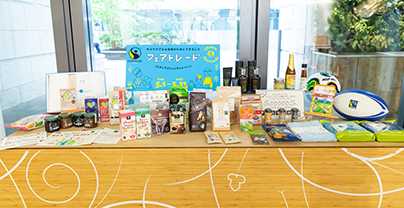
Since April 2011, the Panasonic Group has been promoting the Panasonic NPO/NGO Support Pro Bono Program, which encourages employees to help NPOs and NGOs strengthen their business development capabilities by broadly utilizing their skills and experience they have developed through their work.
Eight employees teamed up to support Fairtrade Label Japan, a certified NPO. Since July 7, 2022, the pro bono team has been deepening their understanding of the fairtrade certification system and its activities, conducting interviews with 10 stakeholder groups, and analyzing the systems of overseas fairtrade groups that support the in-house use of the preceding certified products. On November 10, they presented three deliverables online as final reporting: a proposal for businesses to promote the in-house consumption of fairtrade certified products, a design proposal for "Fairtrade Workplace system" for corporations contributing to the spread of fair trade, and the HP concept.
Japan's fairtrade market aiming to expand further
Seeking to expand the market with the help of the pro bono team
"Fairtrade Label Japan (hereinafter referred to as FLJ)", a member of the Fairtrade International, is an organization that certifies, licenses, and promotes fair trade in Japan.
In order for producers in developing countries to overcome poverty and improve their lives on their own, we have been working to change the awareness of companies, citizens, and governments, to promote the concept of fair trade, and to establish a fairer trade structure through the Fairtrade Label Movement. However, although the size of the Japanese market has grown significantly in recent years, it is still limited in the fairtrade market that is expanding globally. So it was necessary to create a market for expansion.
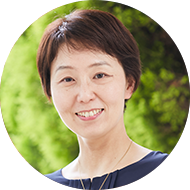
Kaori Nakajima,
Senior Director,
Certified NPO Fairtrade Label Japan
FLJ's relationship with Panasonic began in 2006. Former Executive Director and Senior Director Kaori Nakajima says, "we have received support in the environmental field of the support funds and participated in marketing training. Every program was attractive because it strengthened our organization itself."
On the other hand, she said, "It looks as if we should be able to do more things, but there aren’t so many the four or five members can do. In order to promote fair trade, we need outside help." That’s why we submitted a request for pro bono work.
Prepared sales materials based on interviews with 10 companies
Studied overseas precedents and designed a Japanese version of the certification system
Responding to a request to promote consumption by companies in order to make fair trade a larger social movement, the pro bono team decided to create a sales tool to increase the number of companies that carry fairtrade certified products in cafeterias, shops, vending machines, etc. in companies. First, we conducted interviews with 10 stakeholders, including organizations that carry fairtrade certified products or are already promoting in-house consumption, and narrowed down the targets for sales and the content of appeals.
In addition, we received a request to launch a Japanese version of the Fairtrade Workplace, a certification system for companies engaged in in-house consumption, which has already been launched overseas, and we decided to work on the system design and HP concept planning for this system.
In the final proposal, we presented these three deliverables.
The 14-page "Proposal for Promoting In-House Consumption for Businesses" contains many photos that have an impact based on the feedback from the interviews.
At the beginning of the Proposal, we raised the issue of child labor, poverty, and climate change in many types of ordinary trade, and introduced the fair trade system to solve these issues, the "fair trade premium," a fund for guaranteeing minimum prices and social development in production areas, the benefits of participating in fair trade, the steps to introduce fair trade, the voices of pioneers already working on fair trade, and the Fairtrade Workplace system.
On the last page, we inserted a list of companies that carry fairtrade certified products so that you could order samples.
It was the first time all pro bono members heard about the Fairtrade Workplace system. For this reason, we examined websites in multiple languages for systems in countries such as the UK, Canada, and the Netherlands, which have developed them in advance, and compiled a list of target products, terms for registration, registration methods, and benefits to be obtained, and compared them with similar systems.
From there, we examined the Japanese version of the system, which is suited to the culture and social environment of Japan.
In addition, we summarized the remaining issues that need to be resolved before the start of operation.
We assumed that people would access the Fairtrade Workplace system website from the "Let’s participate" page on the FLJ website. For the HP concept planning, we included the details of the certification system, examples of efforts by certified companies, steps to obtain certification, and overseas examples, assuming that companies already engaged in or planning to engage in in-house consumption of fairtrade products will register after learning about the system and feeling the benefits thereof. We delivered the data not only in PDF but also in PowerPoint so that it could be rewritten as needed.
Comments on the final proposal
Maiko Shiozaki (Executive Director of FLJ)
I think it is a result of your teamwork that, despite the fact that we asked for a wide range of things and had such a large number of members involved, you completed the deliverables that are consistent throughout. In the midst of my impatience to quickly realize the expansion of the fairtrade market, I was deeply moved and encouraged by your warm messages. I thought there would be no one in Japan who knows more about the in-house consumption of fairtrade products than you. We would like to finalize the remaining issues and announce the system by next spring.
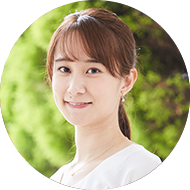
Kaori Nakajima (Former Executive Director and Senior Director of FLJ)
It is very difficult to understand fair trade alone, but I am very impressed that you have clarified the important things such as certification and Workplace from there, designed the system from scratch, and created something that meets our needs. It’s been 25 years since I got to know fair trade. Every time I see my European colleagues ahead of me, I feel discouraged at why things are not progressing so much in Japan, but the fact that you have spent your private time to meet me every week has motivated me to work hard again.

Feedback from the pro bono team
- Kaoru Tanaka
As for fair trade, the pro bono members had heard about it but were not familiar with the details at first. They took time out of their busy schedules to study it seriously, think it over, and come up with the deliverables. We were able to obtain more than just the deliverables, that is the "company." - Kasumi Imada
I wanted to do volunteer work related to overseas for a long time, so I participated in the FLJ's pro bono program to tackle child labor issues. The pro bono members were a group of people who had their specialties, and I thought I was out of place, but everyone was warm, and the two FLJ members were warm, and I became a big fan of them. - Miki Tanaka
I had more time to spare as I started to work from home, so I participated in the pro bono team, where I could use my skills. I thought it was good to go online that we could discuss regularly. Despite all the activities to spread the use of fairtrade products, they are not easily available, so I realized the need to expand them further. - Ayako Morioka
Through my pro bono activities, I have been able to meet people inside and outside the company that I otherwise would not have known, which is my greatest asset. Although I will be away from the team for a while, I would like to continue to exchange opinions and participate in events to stay connected with FLJ for a long time. - Chika Amo
I graduated from the department of international cooperation and did volunteer work when I was a student. This was my first challenge in more than 10 years and I had an exciting time. I feel that both I and the company can grow by establishing a network outside of the company and incorporating the knowledge and experience gained from this network into my duties. - Natsuko Ochi
While working in the same company, I met the pro bono members with various skills and knowledge, and I was able to grow through self-observation. As I work in accounting, I don't usually have a chance to make suggestions to outside customers, but this time as a marketer, I was inspired to think about in-house consumption of fairtrade products by interviewing various companies. - Osamu Fujii
The pro bono activities have been beneficial for me, so I want to promote their appeal at work. The two members of FLJ are the type of wonderful people I have never met before, and I am looking forward to seeing them appear on TV. With the support of various companies and organizations, I hope you will continue to make your fair trade activities a success. - Takuya Miyoshi
It was four months of trial and error with all of us, including FLJ, but I am glad that we were able to share our excitement at the end.
I was also shocked to learn that FLJ has developed a well-known and socially impactful activities with members of such a small office.
It was a great pleasure for me to be part of the activities for the great social good that have been supported recently.
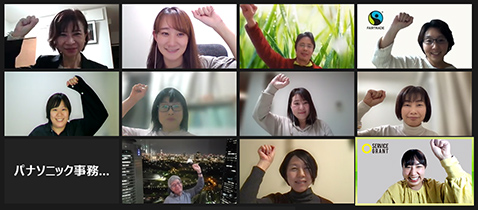
Certified NPO Fairtrade Label Japan
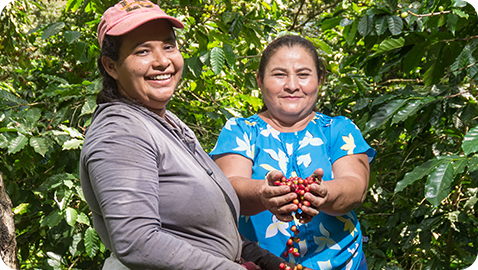
Established in 1993. As a member of the Fairtrade International, it is mainly engaged in the licensing of the FAIRTRADE Marks in Japan, product certification, and fair trade education.
The Pro bono Team Supports Certified NPO Fairtrade Label Japan with Proposal and System Design to Promote In-House Consumption of Fairtrade Products

Since April 2011, the Panasonic Group has been promoting the Panasonic NPO/NGO Support Pro Bono Program, which encourages employees to help NPOs and NGOs strengthen their business development capabilities by broadly utilizing their skills and experience they have developed through their work.
Eight employees teamed up to support Fairtrade Label Japan, a certified NPO. Since July 7, 2022, the pro bono team has been deepening their understanding of the fairtrade certification system and its activities, conducting interviews with 10 stakeholder groups, and analyzing the systems of overseas fairtrade groups that support the in-house use of the preceding certified products. On November 10, they presented three deliverables online as final reporting: a proposal for businesses to promote the in-house consumption of fairtrade certified products, a design proposal for "Fairtrade Workplace system" for corporations contributing to the spread of fair trade, and the HP concept.
Japan's fairtrade market aiming to expand further
Seeking to expand the market with the help of the pro bono team
"Fairtrade Label Japan (hereinafter referred to as FLJ)", a member of the Fairtrade International, is an organization that certifies, licenses, and promotes fair trade in Japan.
In order for producers in developing countries to overcome poverty and improve their lives on their own, we have been working to change the awareness of companies, citizens, and governments, to promote the concept of fair trade, and to establish a fairer trade structure through the Fairtrade Label Movement. However, although the size of the Japanese market has grown significantly in recent years, it is still limited in the fairtrade market that is expanding globally. So it was necessary to create a market for expansion.

Kaori Nakajima,
Senior Director,
Certified NPO Fairtrade Label Japan
FLJ's relationship with Panasonic began in 2006. Former Executive Director and Senior Director Kaori Nakajima says, "we have received support in the environmental field of the support funds and participated in marketing training. Every program was attractive because it strengthened our organization itself."
On the other hand, she said, "It looks as if we should be able to do more things, but there aren’t so many the four or five members can do. In order to promote fair trade, we need outside help." That’s why we submitted a request for pro bono work.
Prepared sales materials based on interviews with 10 companies
Studied overseas precedents and designed a Japanese version of the certification system
Responding to a request to promote consumption by companies in order to make fair trade a larger social movement, the pro bono team decided to create a sales tool to increase the number of companies that carry fairtrade certified products in cafeterias, shops, vending machines, etc. in companies. First, we conducted interviews with 10 stakeholders, including organizations that carry fairtrade certified products or are already promoting in-house consumption, and narrowed down the targets for sales and the content of appeals.
In addition, we received a request to launch a Japanese version of the Fairtrade Workplace, a certification system for companies engaged in in-house consumption, which has already been launched overseas, and we decided to work on the system design and HP concept planning for this system.
In the final proposal, we presented these three deliverables.
The 14-page "Proposal for Promoting In-House Consumption for Businesses" contains many photos that have an impact based on the feedback from the interviews.
At the beginning of the Proposal, we raised the issue of child labor, poverty, and climate change in many types of ordinary trade, and introduced the fair trade system to solve these issues, the "fair trade premium," a fund for guaranteeing minimum prices and social development in production areas, the benefits of participating in fair trade, the steps to introduce fair trade, the voices of pioneers already working on fair trade, and the Fairtrade Workplace system.
On the last page, we inserted a list of companies that carry fairtrade certified products so that you could order samples.
It was the first time all pro bono members heard about the Fairtrade Workplace system. For this reason, we examined websites in multiple languages for systems in countries such as the UK, Canada, and the Netherlands, which have developed them in advance, and compiled a list of target products, terms for registration, registration methods, and benefits to be obtained, and compared them with similar systems.
From there, we examined the Japanese version of the system, which is suited to the culture and social environment of Japan.
In addition, we summarized the remaining issues that need to be resolved before the start of operation.
We assumed that people would access the Fairtrade Workplace system website from the "Let’s participate" page on the FLJ website. For the HP concept planning, we included the details of the certification system, examples of efforts by certified companies, steps to obtain certification, and overseas examples, assuming that companies already engaged in or planning to engage in in-house consumption of fairtrade products will register after learning about the system and feeling the benefits thereof. We delivered the data not only in PDF but also in PowerPoint so that it could be rewritten as needed.
Comments on the final proposal
Maiko Shiozaki (Executive Director of FLJ)
I think it is a result of your teamwork that, despite the fact that we asked for a wide range of things and had such a large number of members involved, you completed the deliverables that are consistent throughout. In the midst of my impatience to quickly realize the expansion of the fairtrade market, I was deeply moved and encouraged by your warm messages. I thought there would be no one in Japan who knows more about the in-house consumption of fairtrade products than you. We would like to finalize the remaining issues and announce the system by next spring.

Kaori Nakajima (Former Executive Director and Senior Director of FLJ)
It is very difficult to understand fair trade alone, but I am very impressed that you have clarified the important things such as certification and Workplace from there, designed the system from scratch, and created something that meets our needs. It’s been 25 years since I got to know fair trade. Every time I see my European colleagues ahead of me, I feel discouraged at why things are not progressing so much in Japan, but the fact that you have spent your private time to meet me every week has motivated me to work hard again.

Feedback from the pro bono team
- Kaoru Tanaka
As for fair trade, the pro bono members had heard about it but were not familiar with the details at first. They took time out of their busy schedules to study it seriously, think it over, and come up with the deliverables. We were able to obtain more than just the deliverables, that is the "company." - Kasumi Imada
I wanted to do volunteer work related to overseas for a long time, so I participated in the FLJ's pro bono program to tackle child labor issues. The pro bono members were a group of people who had their specialties, and I thought I was out of place, but everyone was warm, and the two FLJ members were warm, and I became a big fan of them. - Miki Tanaka
I had more time to spare as I started to work from home, so I participated in the pro bono team, where I could use my skills. I thought it was good to go online that we could discuss regularly. Despite all the activities to spread the use of fairtrade products, they are not easily available, so I realized the need to expand them further. - Ayako Morioka
Through my pro bono activities, I have been able to meet people inside and outside the company that I otherwise would not have known, which is my greatest asset. Although I will be away from the team for a while, I would like to continue to exchange opinions and participate in events to stay connected with FLJ for a long time. - Chika Amo
I graduated from the department of international cooperation and did volunteer work when I was a student. This was my first challenge in more than 10 years and I had an exciting time. I feel that both I and the company can grow by establishing a network outside of the company and incorporating the knowledge and experience gained from this network into my duties. - Natsuko Ochi
While working in the same company, I met the pro bono members with various skills and knowledge, and I was able to grow through self-observation. As I work in accounting, I don't usually have a chance to make suggestions to outside customers, but this time as a marketer, I was inspired to think about in-house consumption of fairtrade products by interviewing various companies. - Osamu Fujii
The pro bono activities have been beneficial for me, so I want to promote their appeal at work. The two members of FLJ are the type of wonderful people I have never met before, and I am looking forward to seeing them appear on TV. With the support of various companies and organizations, I hope you will continue to make your fair trade activities a success. - Takuya Miyoshi
It was four months of trial and error with all of us, including FLJ, but I am glad that we were able to share our excitement at the end.
I was also shocked to learn that FLJ has developed a well-known and socially impactful activities with members of such a small office.
It was a great pleasure for me to be part of the activities for the great social good that have been supported recently.

Certified NPO Fairtrade Label Japan
Established in 1993. As a member of the Fairtrade International, it is mainly engaged in the licensing of the FAIRTRADE Marks in Japan, product certification, and fair trade education.


